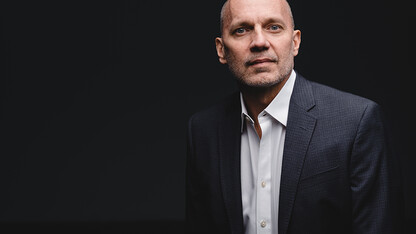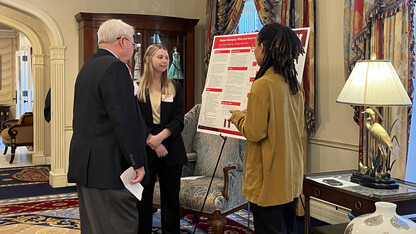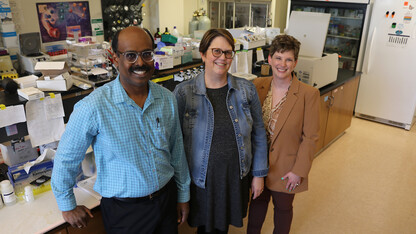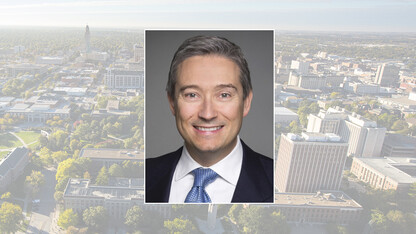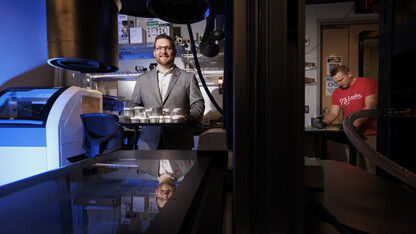· 10 min read
2020 political landscape ripe for study
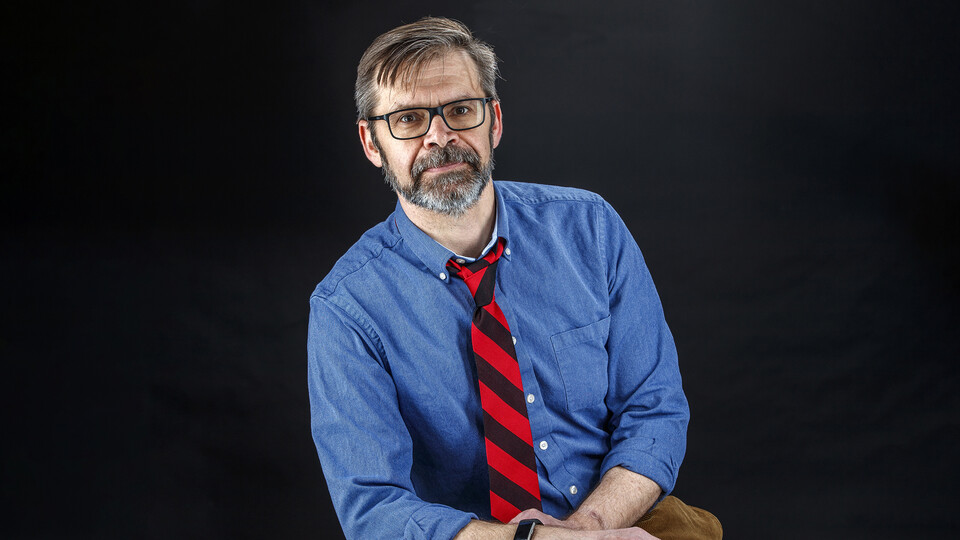
Depending on how one looks at it, the year 2020 is either a boon or boondoggle for political scientists.
Kevin Smith, Leland and Dorothy Olson Chair of Political Science at the University of Nebraska–Lincoln, sees plenty of questions worth exploring and ways of building on past research.
Smith and co-author John Hibbing laid the empirical foundation for understanding that political ideologies are based on our biology, but as Smith explains, environment matters — and 2020 is certainly an odd environment.
In a conversation with Nebraska Today, Smith delved into that past research and its relationship to pervasive polarization, how politics are making us sick and where the field will go from here.
How did you end up teaching at the University of Nebraska–Lincoln, and what is your background that brought you here?
My background was not that of an academic. My undergraduate degree is in journalism, and I was a political reporter for approximately half a decade. And then I was a political columnist for a number of years after. I was so interested in politics, I thought I should be a better student of the system I was covering. I went to graduate school to get a master’s degree in political science and after my first graduate seminar, I got hooked, got the Ph.D. and went looking for a job as an academic. I ended up teaching at the University of Nebraska–Lincoln, because the University of Nebraska–Lincoln was very nice and offered me a job. This was my first academic position. I’ve had several offers to jump since then, but I guess I’m a Husker through and through.
Your research covers quite a bit on the biological underpinnings of political ideology. Where did that idea come from?
That research question came from a number of places. Broadly speaking, my individual journey to that was, back in the 1990s, I was doing a lot of policy research and at that time, policy research was primarily being driven by economic models — this notion that everyone is a rational, cost-benefit calculating machine. I kept getting up at conferences and writing papers saying, ‘I don’t know any humans who behave this way.’ And the response to my research at that time was ‘OK, smart guy, what’s your theory of human behavior?’ and I didn’t have one. So I started looking very heavily at psychology — as opposed to economics — and that led me to biology.
I worked my way back to Darwin and came forward, and out of that journey, through a very, very disparate literature, I came to the conclusion that, you know, I’m willing to bet that people’s behavior is at least partially anchored in their biology. We started out first looking at evolutionary psychology and behavioral economics, and we very quickly jumped from that to behavioral genetics.
Obviously, you’ve had a lot of findings to support that we are biologically-inclined to lean one way or the other. Right now, as a nation, we’re so polarized, and that isn’t likely to be caused by biology. As a political scientist, how do you explain our current polarization? And is there any way of coming back?
There are two questions there, and I think I can answer one. The other, I think, is the $64,000 question that I’m not sure I or anyone else can answer. At least part of the answer to the question of why we are so polarized is that the environment matters. Just because our biology is relevant to our political attitudes and behaviors, and parts of our innate psychology are important to our political attitudes and behaviors, does not mean that the environment doesn’t matter. This is one of the things that people sometimes get confused about with our research.
Genetics is not destiny. Genetics help predispose you to react certain ways to whatever stimuli you find in your environment. Basically, what it does is, it nudges the probabilities one way or the other to how you’ll react to a message or a stimulus in your environment. If you’re in an environment where a lot of the stimuli and a lot of the messages are playing on people’s innate predispositions to move in polarized directions, you know what? — you’re going to end up with a polarized society. And I think that’s exactly where we are right now.
It’s not just the politicians. We have the rise of social media. We have the collapse of traditional gatekeepers. People can live in their own echo chambers. We essentially live in an environment where if you have a predisposition to move strongly one way on a political issue, this environment is tailor-made for pushing you that way.
In terms of what we can do to mediate polarization, unfortunately, this is one of those situations where the genie is out of the bottle, and it’s a lot harder to put it back in. As a professor, I should say, ‘well, the obvious approach is we just need to educate everybody.’ But I’m a little skeptical about that approach. Ultimately, what you need is a willingness on both sides to engage with each other in good faith, which is easy to say, but how do you bring that about right now? I’m not sure that I’ve got a better answer than anyone else.
You mentioned before you have a background in political journalism. How does that shape you as a political scientist, because I know those are two wildly different ventures. But do they converge?
I think one of the things about my background as a journalist is I am attuned to people’s ground truth in a way that I’m not sure that I would be if I was solely an academic. As an academic, effectively, I am a data jock. I deal with fairly large data sets. I crunch a lot of numbers. I do a lot of sophisticated statistical modeling. That’s a long way from what I did as a journalist. As a journalist, I went out and I spoke to homeless people on the street all the way to the President of the United States, and everyone in between. Having that background, I think, gives me an appreciation for the complications of the human experience that don’t necessarily show up in a spreadsheet.
Last year, you published a study that showed politics is literally making us sick. Have you explored that any further?
With that research, we did a study where we effectively took the self-diagnostic batteries for alcohol addiction and gambling addiction, and translated those into politics. We were a little astonished at the effects we found on people’s social, emotional and even physical health that they attributed to politics. I mean, nearly 40% of Americans reported being stressed out and roughly a fifth said they’d lost sleep and the same amount said they had been depressed. Five percent of Americans said that they have considered suicide because of politics. We had a survey of about 800- 900, so you can take it with a grain of salt. But with 5%, if our data is even in the ballpark, you’re talking about an astonishing number of people who are considering doing themselves harm because of stuff they read in the news about politics, and I find that concerning.
One of the things that we’re doing this election is we’re going back into the field a couple of weeks before the election, and a couple of weeks after the election, with some follow-up surveys. We’ll see what those results say. I’ve got to say I can’t wait to see what the data tells us. We collected the original data in 2017. And I think I’m on firm ground saying that I don’t think things have gotten a whole lot better since then.
That brings me to my next question. This year has been very unusual in a number of ways. I’m probably understating that, but how have you handled it personally and as a professor?
Well, I think personally, I handle it the way everyone else does, which is one day at a time. I mean, this is just a very, very strange and kind of upside-down world right now. And, you know, even at work, I’ve had lots of questions from faculty and students. I’m a departmental chair, and for a lot of questions, my only honest answer is ‘you know, I really don’t know, it’s my first global pandemic, too.’ And then you’ve got all the craziness of what’s going on in politics right now. It is so polarized and so divided. As a political scientist, I’m getting questions not just from journalists in the media, but from family and friends. ‘What’s going on? Explain this to me.’ Well, give me a couple of years, let me work through the data on that – I think everyone finds that answer less than satisfying.
It feels like a lot of political norms have been thrown out the window.
They have.
How do you approach that as a political scientist? Where does political science go from here?
I don’t think there’s one answer to that. Certainly, the current situation has created the opportunity for investigating some interesting questions, even some scary questions. A question that’s on the forefront of a lot of political scientists’ minds now is, ‘what happens if people lose faith in the democratic process, that elections are reasonably fair?’ We’ve never had — at least as long as I’ve been an academic or a journalist — a widespread real possibility that a lot of people will lose faith in the electoral process. It’s incumbent upon us to follow up on those questions. In that case, it is offering unique opportunities.
Some of the basic questions that we ask though, ‘why do people vote?’ and ‘why do people have the attitudes that they do?’ ‘Why are they engaging in politics or not engaging in politics?’ Those questions are perennial questions, but it’s a really new environment in which to explore answers to those questions.
One of the biggest changes, honestly, is not just in research, it’s in teaching. One of the things that middle-aged people like me have to remember is, to an 18- or 19-year-old college student, this is normal, because that’s all they know. Engaging with citizens on that level who do not have decades of memory of the political system is kind of a unique experience.
Post-COVID, and post-2020, are there lessons that will be learned? Are there ways we’ll come out of this stronger?
I think 2020 is the year that is going to launch 1,000 dissertations. That’s for sure.
Just speaking from my parish, in terms of political science, there are institutional questions. I mean, we’ve really gotten a stress test. There are questions about communication and public opinion, the role of social media, for example, and there are also really interesting psychological questions. How does this environment of running an election during a global pandemic affect people’s psychology from a political point of view?
This is really a unique opportunity. Do people’s political attitudes become crystallized, do they become more extreme because of what’s going on? If you’re feeling more threatened because of the pandemic, does that filter through into your political attitudes and behaviors in any way? There’s a ton of stuff to visit, there’s a ton of stuff to look at. I guess the silver lining is, it’s like a Full Employment Act for political science.






